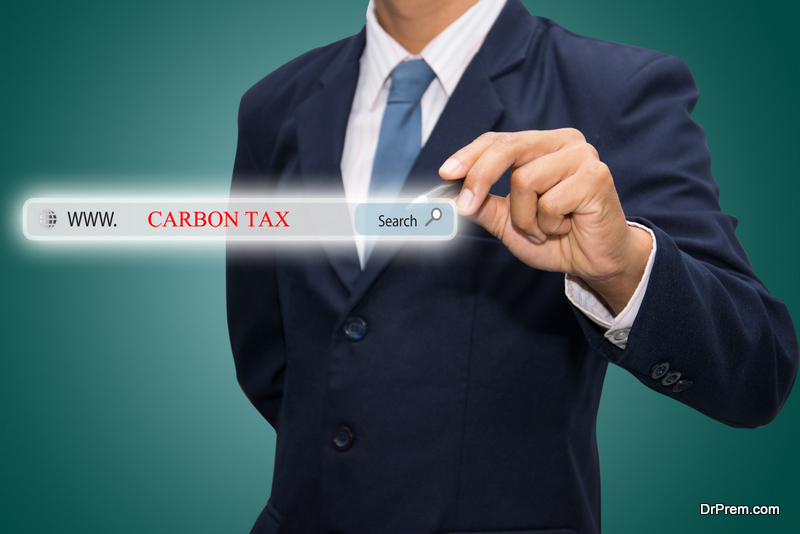Implementing carbon taxes seems to be imperative to mitigate global warming. Rising carbon emissions is taking a toll on the global climatic condition. The strong link between burning fossil fuels and deadly weather changes has long been established, which went unheeded by the policymakers since long. Now, perhaps the time has come to act.
Policy on taxing carbon is drawing serious global attention as countries and citizens and rising number of global businesses are voting in its favor. Such a tax along with proper regulation can have a significant impact on the consumer and corporate behavior helping in creating a cleaner environment for the posterity.
The carbon tax is not meant for punishing but is aimed to shape the behaviors that will lead all to make rational choices over time. Consumers and corporations will switch to using alternative renewable sources of energy and energy efficient gadgets resulting in lower carbon emissions.
What is a carbon tax?
It is assigning a price on carbon emission either as a fee or tax on the usage of fossil fuels which is returned back to the society through a number of developmental projects undertaken by the government.
Pricing on carbon may not be palatable for the common public. Many politicians believe that an added tax may upset voters already struggling with high energy cost but this is quite appealing to many economists, environmentalists and businesses.
Global initiatives in introducing Carbon pricing:
Last year’s UN’s climate change conference in Bonn witnessed thousands of participants fighting climatic change. The Paris Climate Agreement held two years back also met with huge success promising continued collaboration. In a recent promising initiative in the Carbon Pricing Leadership Coalition, 30 governments and over 180 business organizations and strategic partners have joined hands to assign a value in the form of carbon pricing or carbon tax.
If the goal of Paris summit is to be achieved that is limiting average global temperature rise below 2° C, a dramatic cut in carbon emissions is a must. One of the best ways to achieve this is to transfer the socio-economical cost of carbon emission to the polluter from the public.
About 40 countries including Canada are implementing the carbon tax. China, in 2015, announced the world’s largest carbon pricing system and is taking major steps to reduce carbon emission. The World Economic Forum reports, the Carbon Disclosure Project (2017) revealed that the number of businesses implementing internal carbon pricing has shot to 1400 from 150 in 2014 which includes more than 100 global business leaders generating over $7 trillion revenue.
Would carbon taxes benefit or hurt the society in the long run?
By taxing carbon emission, governments can generate more revenue to invest in clean energy, healthcare and education projects creating a win-win situation for all. A growing body of business organizations also is of the view that implementing carbon taxes is one of the best ways to mitigate global warming. They have also recognized that their businesses can thrive in spite of this environment cleansing effort.
Skeptics are of the opinion that carbon taxes might lead to a paradoxical situation causing job losses and overburdening the commoners, especially those at the lower end of the economic spectrum. It may also increase global emissions.
The reason is it is assumed that taxing carbon would eliminate the need for government regulation but theoretically, it has been found to be the opposite. Complicated carbon pricing schemes add much to the regulatory compliance cost.
The second reason is the carbon-leakage, the carbon emission caused by another country taking advantage of the strict environmental policies of one country. This can worsen the situation, cause job losses and raise the global carbon emission in the long run.
For example, a manufacturing plant in Canada implementing the carbon tax and emitting far less quantities of carbon may end up in facing losses in competition with the same plant in the US not going with such green tax but emitting carbon at a much higher quantity.
Study says a tax on carbon emission can bring about significant climate changes:
 While the debate goes on whether carbon pricing can be effective in fighting climatic change or not, an extensive analysis carried out by researchers at the MIT and National Renewable Energy Laboratory (NREL) finds this as the best solution to address this problem.
While the debate goes on whether carbon pricing can be effective in fighting climatic change or not, an extensive analysis carried out by researchers at the MIT and National Renewable Energy Laboratory (NREL) finds this as the best solution to address this problem.
Given a fair mechanism of carbon taxing in operation, this could be quite fair and not hurt low-economic households. The study was a multi-group effort that adopted sophisticated modeling tools to assess the impact of various carbon pricing schemes minimizing the regressive effect that may highly impact the low-income group.
According to the analysis, an initial $50 tax per ton carbon emission and later an annual 5% increment could lead to about 63% reduction in total carbon emission in the US by 2050 which exceeds than the proposed target of 50% reduction by that time period.
To go by the US commitment in the Paris Agreement, an initial $25 tax would be adequate to meet the carbon reduction target by 2030 but the rate of increase per year is important which should be 5%. A 1% increase per year will not serve the purpose.
Studying various research models, the researchers found that the best solution in carbon reduction along with spurting the economic growth is to combine the strategy of tax-breaks to corporations and adding rebates to the low-income group most affected by the tax.
Simply put, a chunk of the revenue earned through tax can be diverted to the poorest households and the rest for other tax cuts. The study further showed that less than 10% of revenue earned from the carbon tax would be enough to compensate poor households facing its regressive impact.
This study was completed before the new tax reforms were implemented in the US this year that substantially reduced corporate income tax rates. Since these cuts will add to the growing deficit, the revenue from carbon pricing can contribute to reducing it.
The benefits of Carbon taxes can be leveraged through a proper pricing model:
Tax in any form is not welcomed by people. The mechanism of carbon pricing is not clear in public minds. It is therefore likely to receive mass rejection and impact their voting preferences, which politicians fear most.
Let us not forget the example of Australia where carbon tax has been repealed by the new government who was voted to power based on its promise of abolishing this tax. Therefore, governments need to develop their own carbon pricing model based on their economy to clean the environment alongside spurting the economic growth.






